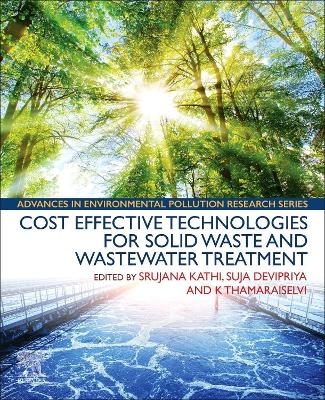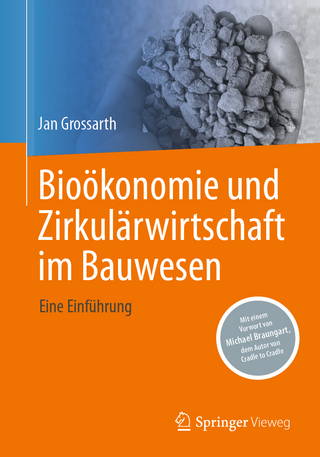
Cost Effective Technologies for Solid Waste and Wastewater Treatment
Elsevier Science Publishing Co Inc (Verlag)
978-0-12-822933-0 (ISBN)
Serving as a practical guide to state-of-the-art methods, Cost-Effective Technologies for Solid Waste and Wastewater Treatment also delivers offers foundational information on the practical design of treatment and reuse systems and explains the treatments in terms of scale, efficiency, and effectiveness. It focuses on cost-effective technologies that are particularly applicable to environmental clean-up, such as bioaugmentation and biostimulation of plastics, activated carbon, phytoremediation, crude oil pollution stress, adsorbents, contaminants of emerging concern, anaerobic digestion, ISCO, biosorption, bioremediation, radioactive contaminants, constructed wetlands, nanoremediation, and rainwater. As such, it is a valuable and practical resource for researchers, students, and managers in the fields of environmental science and engineering, as well as wastewater management, chemical engineering, and biotechnology.
Srujana Kathi is an independent researcher in the Department of Ecology and Environmental Sciences at Pondicherry University. Her interests range from environmental monitoring and assessment and phytoremediation to environmental epidemiology and cognitive neuroscience. She completed her doctoral thesis on Bioremediation of Polycyclic Aromatic Hydrocarbons in Soil at Pondicherry University. She has written multiple journal articles and book chapters. Suja P. Devipriya is Assistant Professor of Pondicherry University. She received her PhD in Environmental Technology from Cochin University of Science and Technology. Her primary areas of interest include environmental photocatalysis, environmental biotechnology, solid waste management, and industrial ecology. Previously, she was a Senior Research Fellow at Cochin University of Science and Technology, and then a Post-Doctoral Fellow at Bowling Green State University in the US. K. Thamaraiselvi is Associate Professor of Environmental Biotechnology at Bharathidasan University. She received her Masters in Ecobiology and her PhD in Environmental Sciences from Bharathiar University. Previously, she was a postdoctoral researcher at CIES in France and then a Research Professor at Yonsei University in South Korea. Since 2018, she has been an Executive Committee Member in the Clean Green Initiative at Bharathidasan University. Her areas of research include molecular bioremediation, bioenergy production, microbial biodiversity, environmental risk assessment, and nanobiotechnology. She has written more than 30 journal articles and 6 book chapters. Dr. Muhammad Zaffar Hashmi is Assistant Professor of Environmental Engineering in the Department of Chemistry, COMSATS University, Pakistan. He received his Ph.D. in Environmental Chemistry and Toxicology from Zhejiang University, China. Dr. Hashmi’s research interests are analytical chemistry and the development of treatment technologies to control environmental and industrial pollution. He also has expertise in developing environmentally sustainable and feasible technologies including bioremediation, using innovative microbes and genes, plants, and microcosms. He has edited seven books, 14 book chapters, 80 original research articles and is currently series editor of two environmental contaminant book series. Dr. Hashmi is also an Associate Editor of the Arabian Journal of Geosciences. Dr. Hashmi is Member of the Pakistan Academy of Sciences, International Toxicology Society, HEC and PSF Research Grants Committee, and has been awarded a KANS Prize in OIC countries by MUSTAFA Science and Technology Foundation.
1. An introduction to cost-effective technologies for solid waste and wastewater treatment Madhuraj Palat Kannankai and Suja Purushothaman Devipriya 2. Bioaugmentation and biostimulation of dumpsites for plastic degradation: A critical insight Shaileshkumar Baskaran and Mythili Sathiavelu 3. Bioremediation approach for treatment of soil contaminated with radiocesium M. Srinivasulu, G. Narasimha, and A.J. Francis 4. Management of biodegradable waste through the production of single-cell protein Rajeswari Uppala and Azhaguchamy Muthukumaran 5. Application of plant-based natural coagulants in water treatment Arunkumar Patchaiyappan and Suja Purushothaman Devipriya 6. Recent applications of downflow hanging sponge technology for decentralized wastewater treatment Mahmoud Nasr, Michael Attia, Hani Ezz, and Mona G. Ibrahim 7. Assessment of biochar application in decontamination of water and wastewater Alaa El Din Mahmoud and Srujana Kathi 8. In situ chemical oxidation (ISCO) remediation: A focus on activated persulfate oxidation of pesticide-contaminated soil and groundwater Rama Mohan Kurakalva 9. Composting of food waste: A novel approach M. Anand, T.B. Anjali, K.B. Akhilesh, and John K. Satheesh 10. Biological pretreatment for enhancement of biogas production Aishiki Banerjee, Binoy Kumar Show, Shibani Chaudhury, and S. Balachandran 11. Recent trends in bioremediation of pollutants by enzymatic approaches M. Srinivasulu, M. Subhosh Chandra, Naga Raju Maddela, Narasimha Golla, and Bellamkonda Ramesh 12. Phytoremediation of heavy metals and petroleum hydrocarbons using Cynodon dactylon Srujana Kathi 13. Proteobacteria response to heavy metal pollution stress and their bioremediation potential Nyoyoko Veronica Fabian 14. Treatment of harvested rainwater and reuse: Practices, prospects, and challenges Siril Singh, Rajni Yadav, Srujana Kathi, and Anand Narain Singh 15. Phytoremediation: A wonderful costeffective tool for the treatment of waste disposal Rajni Yadav, Siril Singh, Abhishek Kumar, and Anand Narain Singh 16. Vermicomposting: An efficient technology for the stabilization and bioremediation of pulp and paper mill sludge Subpiramaniyam Sivakumar, Kaliannan Thamaraiselvi, Duraisamy Prabha, Thyagarajan Lakshmi Priya, Hong Sung-Chul, Yi Pyoung-In, Jang Seong-Ho, and Suh Jeong-Min 17. Potential of solid waste prevention and minimization strategies Anbarashan Padmavathy and Munisamy Anbarashan 18. Nanoremediation of pollutants: A conspectus of heavy metals degradation by nanomaterials Nt Nandhini and Mythili Sathiavelu 19. Excess fluoride issues and mitigation using low-cost techniques from groundwater: A review Adane Woldemedhin Kalsido, Beteley Tekola, Beshah Mogessie, and Esayas Alemayehu 20. Cost-effective biogenic-production of inorganic nanoparticles, characterizations, and their antimicrobial properties Kishore Kumar Kadimpati and Narasimha Golla
| Erscheinungsdatum | 27.10.2021 |
|---|---|
| Reihe/Serie | Advances in Pollution Research |
| Mitarbeit |
Herausgeber (Serie): Muhammad Zaffar Hashmi |
| Zusatzinfo | 35 illustrations (20 in full color); Illustrations |
| Sprache | englisch |
| Maße | 216 x 276 mm |
| Gewicht | 880 g |
| Themenwelt | Naturwissenschaften ► Biologie ► Ökologie / Naturschutz |
| Technik ► Umwelttechnik / Biotechnologie | |
| ISBN-10 | 0-12-822933-0 / 0128229330 |
| ISBN-13 | 978-0-12-822933-0 / 9780128229330 |
| Zustand | Neuware |
| Haben Sie eine Frage zum Produkt? |
aus dem Bereich


